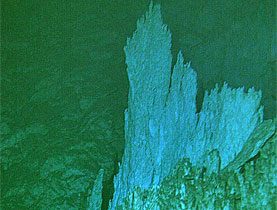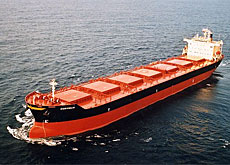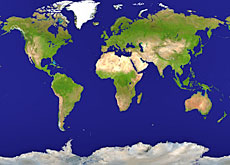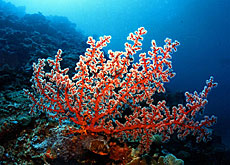Switzerland takes on the sea

Landlocked Switzerland has moved to ratify the United Nations Convention on the Law of the Sea, despite initial hesitation by the government.
The cabinet called on parliament to approve the international agreement which dates back to 1982. Switzerland is one of the few industrialised countries not to have ratified it.
“Switzerland, as a land-locked country, has waited to ratify it until a large proportion of important industrial states had joined the convention,” says foreign ministry spokesman Lars Knuchel.
But Lucius Caflisch, emeritus professor of international law and member of the UN international law commission, finds the delay strange.
“We should have done this in about 1985. Money was the stumbling block. There are very minor amounts by Swiss standards that have to be paid in keeping up the international organisation that is behind this,” says Caflisch.
He headed the Swiss delegation to the conference which elaborated the convention for part of the 15 years it took to draw it up.
At the time the Swiss foreign ministry maintained that the convention was of little interest to a landlocked country.
“The answer to that was that it was interesting precisely because Switzerland is a landlocked country,” Caflisch told swissinfo.
Freedom of navigation
Switzerland is highly dependent on international trade, and most of its imports and exports travel by sea. It even has a small merchant navy of its own, consisting of 33 ships.
Freedom of navigation and the freedom of overflight – the convention also covers the airspace above the seas – are of vital importance, according to Caflisch.
Although today Switzerland enjoys these rights, “tomorrow is another question. That’s why you sign conventions.”
The document the government has now issued in favour of ratification says that it is important for as many states as possible to do the same.
“For small and medium-sized states like Switzerland this is of great importance, since to a large extent they seek the protection of their international interests in the rules of international law,” the statement says.
The government is also looking ahead and sees opportunities for Switzerland – and dangers if they are not seized.
Mineral resources
As easily accessible mineral resources – oil in particular – become exhausted, there is naturally more and more interest in those that may be available in the deep seas.
But Caflisch does not believe the Swiss government’s policy is in response to moves by a number of coastal states hoping to extend their rights over their continental shelves.
In its outline the government quotes forecasts that over the next century 90 per cent of commercially extracted minerals will come from the sea bed.
“Swiss industry is certainly interested in delivering equipment, such as turbines and other technical aids,” it points out.
“Not to take part in the convention would be political foolishness and would deprive Switzerland – a land with few raw materials of its own – of chances which in the medium term could be essential to keep it supplied with basic materials.”
Research
Swiss scientists, with Swiss financing, have long been involved in international deep sea research.
But this research is so costly that it requires collaboration, as Gretchen Früh-Green, senior scientist at the department of Earth Sciences of the Federal Institute of Technology in Zurich, explains.
Her group works largely with colleagues from the United States and Europe.
“Some people call the sea the last frontier. Less than ten per cent of the sea floor has really been looked at or investigated,” she told swissinfo.
Although she is not convinced that as much as 90 per cent of mineral resources will come from the sea, she agrees that the proportion will certainly be higher than today.
“Companies will be looking more towards the continental margins. There’s a lot of organic material there and methane that’s being created that they’ll probably find a way to exploit,” she said.
But exploration poses immense challenges. Salt, strong currents, high gas pressure and immense depth all make drilling difficult.
Part of Früh-Green’s work is involved in investigating marine eco-systems, which can be upset even without human intervention.
The government cites protection of the marine environment as another reason why Switzerland should ratify the convention.
“Durable protection of the eco-system of the world’s oceans has a positive impact on the climate and the preservation of maritime resources,” it says.
swissinfo, Julia Slater
The UN Convention on the Law of the Sea was signed in 1982.
It covers all aspects of the use of the sea, including rights of navigation, the management and exploitation of fishing and mineral resources and the protection of the marine environment.
Coastal states have complete jurisdiction over the first 12 miles of sea around their shores, subject only to the provisions giving other nations right of passage.
Coastal states have jurisdiction over the resources – animal and mineral – in an “exclusive economic zone (EEZ)” of 200 miles from the shore.
Some 30 states whose continental shelf extends beyond 200 miles may claim the right to manage and exploit resources up to 350 miles from shore.
Four conventions on the law of the sea were drawn up in 1958, and Switzerland joined them in the mid-1960s.
The 1982 Convention took over most of their provisions and developed further rules on the exploitation of the sea bed.
In 2004 the Swiss parliament recommended to the cabinet that the convention should be ratified.
In May 2008 the government issued a document in support of ratification.

In compliance with the JTI standards
More: SWI swissinfo.ch certified by the Journalism Trust Initiative



You can find an overview of ongoing debates with our journalists here. Please join us!
If you want to start a conversation about a topic raised in this article or want to report factual errors, email us at english@swissinfo.ch.